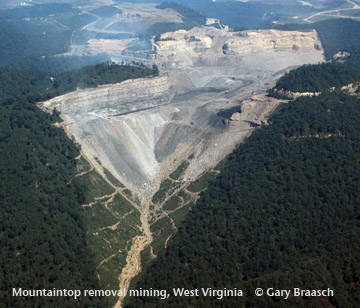Climate News and Views
November 2010:
U. S. Senate does not pass climate legislation and mid-term wins by GOP promise no further bills on this subject
In Washington, Senators did not consider or pass climate and energy legislation in 2010. Thus the plan and promise by the U.S. in Copenhagen, for a comprehensive national plan to reduce CO2 across the board toward a 2050 international timetable, appears to be off the table in Congress for the year. Republican gains in the midterm elections, including election of many avowed disbelievers in the theory and data of climate change, bode ill for a national program on climate and energy in the next session also.
The Senate did defeat a measure that would have taken away the Environmental Protection Agency's authority to control CO2 as a pollutant under the Clean Air Act, so controls on vehicles and power plants are still in the works at EPA. This is sure to come up again in the next session. Earlier in the year, Senator Jeff Merkley of Oregon proposed an aggressive plan heavily focused on switching to electric vehicles, increased mileage on larger and off-road vehicles, and better transit options. This is one example of how much oil can be saved and thus not burned to release CO2 by transportation changes we know how to do now -- in this case all of our imported oil needs eliminated by 2030, which is 63 percent of the oil we burn each year.
Worldwide, it seems clear that the only change that had any effect of reducing fossil fuel and energy use was the Great Recession, a trade off which millions who are still out of work would not be much in favor of. According to numbers released by a department of BP (yes, that BP ... which has a statistical department many rely on for world energy statistics) for the first time since the 1980s world energy use decreased in 2009, by 1.1 percent. The U.S. and Europe showed reductions in energy production thanks to the recession, but China's energy use increased greatly. Coal provided nearly 30 percent of world energy, the greatest percentage since 1970 -- definitely a bad sign since coal is the worst global warming polluter. According to the report, global wind and solar generation capacity shot up by 31 percent and 47 percent respectively, but still are a tiny part of all energy sources. Wind power growth was led by China and the US, which accounted for a combined 62 percent of total growth.
With no strong and sustained U.S., Chinese or world controls on greenhouse gas emissions, the atmosphere continues to warm. The latest in ongoing scientific reports was issued by climatologist James Hansen, head of NASA's Goddard Center, saying that their analysis showed that 2010 so far was the warmest year they had measured. "The new record temperature in 2010," wrote Dr. Hansen, "is particularly meaningful because it occurs when the recent minimum of solar irradiance is having its maximum cooling effect." Hansen said, " It is likely that global temperature for calendar year 2010 will exceed the 2005 record, but that is not certain if a deep La Nina develops quickly." This could confirm the direction the year had been going according to NOAA analysis that both March and April were the warmest ever recorded. And in the Arctic, according to the National Snow and Ice Data Center, "air temperatures remained above average, and sea ice extent declined at a rapid pace. At the end of the month, extent fell near the level recorded in 2006, the lowest in the satellite record for the end of May."
While oil keeps gushing, April sets heat record and U.S. scientists warn of onrushing global warming.
While the United States was transfixed by the BP Gulf oil gusher which continued spreading and polluting into its second month, the results of the world's addiction to oil and coal were being demonstrated in detail. NOAA's climate data center reported that the combined global land and ocean average surface temperature for April was the warmest on record at 58.1°F (14.5°C). This was also the 34th consecutive April with global land and ocean temperatures above the 20th century average. Weather extremes in the U.S. from January to April were also high, with three times larger than average areas of extreme wetness and twice the usual area with warmer-than-normal low temperatures.
The U.S. National Academy of Science reported on May 19 that this and other strong evidence on climate change requires urgent coordinated action. America's Climate Choices, a study independent of the UN and IPCC requested by the U.S. Congress, confirmed that a "strong, credible body of evidence, based on multiple lines of research ... indicates that recent warming is largely caused by human activities, especially ... the burning of fossil fuels." The report called for national priority action to limit climate disruptions, including establishment of a central coordinating body to guide the nation's reaction and adaptation to rapid changes already underway. Just two weeks before, 255 scientists published a forceful letter in the journal Science, saying: "For a problem as potentially catastrophic as climate change, taking no action poses a dangerous risk for our planet."
Stormy weather ahead for the U.S. Senate climate and energy bill? -- The American Power Act is finally released (from May 2010)
Nearly 11 months after the U.S. House passed comprehensive climate and energy legislation and in the greasy wake of the continuing Gulf oil spew, the Senate finally has its climate bill on the table. Senators John Kerry and Joseph Lieberman introduced their "American Power Act" on May 12, hoping the reaction against the BP oil leak will spur public opinion and passage in the Senate. The bill no longer has its only Republican sponsor, Lindsey Graham, and chances for passage are seen as mixed. The 987-page bill is, as Andy Revkin of the Dot.Earth blog wrote, "a classic piece of American legislative compromise...." It contains a staged cap and trade system, rebates a lot of the income back to low income citizens from the beginning, and promises $70 billion in cleaner energy investment (compared to $100 b in the House bill). For a comparison of this bill with the House-passed provisions AND campaign statements on climate action by Barack Obama, please see Joe Romm's blog, Climate Progress. And as a result of the Gulf oil disaster, Kerry and Lieberman added new limits on offshore oil drilling and more control by coastal states --- however incentives for domestic oil drilling as well as nuclear and "clean coal" development remain. For other views, check out Grist Magazine. News of the Gulf oil spew is the lead story in Climate News and Views.
President Obama, Administration officials initiate energy and climate rules, from coal mining restrictions and mileage standards to off-shore drilling.
President Obama and Administration officials alternately angered and heartened the public with a series of energy/climate programs announced in early Spring 2010. Here are highlights and commentary:
Automobile gas mileage of new cars to increase to 35 mpg by 2016

Joint action announced on April 1 by the Transportation Department and the EPA "will significantly increase the fuel economy of all new passenger cars and light trucks sold in the United States." The government press release said, "The rules could potentially save the average buyer of a 2016 model year car $3,000 over the life of the vehicle and, nationally, will conserve about 1.8 billion barrels of oil and reduce nearly a billion tons of greenhouse gas emissions over the lives of the vehicles covered." Right now the average for the U.S. vehicle fleet is only a bit over 17 mpg, according to a study in 2009, and with many cars staying on the road for more than 15 years, it will take some some to boost the average to the higher level needed to reduce greenhouse gases significantly. The White House said it was doing its part to shift to higher mileage cars by doubling the Federal hybrid vehicle fleet and by purchasing the first 100 plug-in electric vehicles to roll off American assembly lines.
Off-shore drilling areas opened from Gulf of Mexico to the Arctic Ocean (Note, November 2010: This wins the prize for most short-sighted or perversely ironic announcement of the President)
The opening of petroleum drilling areas in the Gulf of Mexico, off the SE Atlantic coast and north of Alaska was announced by President Obama on March 31(at the same time as the plan for higher gas mileage). According to the White House press release, "the Administration's strategy calls for developing oil and gas resources in new areas, such as the Eastern Gulf of Mexico; increasing oil and gas exploration in frontier areas, such as parts of the Arctic and Atlantic Oceans; and protecting ocean areas that are simply too special to drill, such as Alaska's Bristol Bay. The strategy will guide the current 2007-2012 offshore oil and gas leasing program, as well as the new 2012-2017 program that this administration will propose. More specific details on this plan are available at www.doi.gov."
Reaction from environmentalists and some local officials was swift and strong, condemning the decision to open any off shore regions as short sighted in light of climate change and the value of the beaches and coastlines that would be threatened by any oil spills, according to a compilation of quotes on EnviroKnow. An analysis published in the NY Times on April 5 estimated that the reality of off shore drilling may mean only a million barrels a day from these locations, and only after 10-15 years of effort. But I do not agree with this article's premise that off shore drilling is a good idea and we should really be doing it off California. Public transportation already saves the U.S. the equivalent of 4.2 billion gallons of gasoline annually which requires about 200 million barrels of petroleum to make With the savings per year estimated from the vehicle mileage increase to 35 mpg, about 120 million barrels per year, and the many other efficiency and transportation improvements coming in the next decade such as urban light rail, high-speed intercity rail and electric vehicles, we are well on the way to reducing our need for new AND imported oil. The U.S. currently imports more than 12 million barrels of petroleum each day --- most of it from Canada, Mexico, Nigeria, Saudi Arabia and Venezuela -- costing more than a billion dollars daily (at today's $87/barrel price). The fastest and most economical ways to cut oil use and its greenhouse pollution are ready now and should be pushed into greater use: higher vehicle mileage, driving less both by individual actions and by attractive public transportation, insulation and home efficiency programs to save heating oil and electricity, replacing coal and natural gas electric generation with wind and solar and efficient building technology.
Rules tightened on dumping into streams from mountaintop removal coal mining
Following up on the scientific studies about the harm from mountaintop removal mining (see below), the Environmental Protection Agency set what it termed "clear benchmarks for preventing significant and irreversible damage to Appalachian watersheds at risk from mining activity. Mountaintop removal is a form of surface coal mining in which explosives are used to access coal seams, generating large volumes of waste that bury adjacent streams. The resulting waste that then fills valleys and streams can significantly compromise water quality, often causing permanent damage to ecosystems and rendering streams unfit for swimming, fishing and drinking. It is estimated that almost 2,000 miles of Appalachian headwater streams have been buried by mountaintop coal mining."
EPA chief Lisa Jackson said, "Let me be clear. This is not about ending coal mining. This is about ending coal mining pollution. … We expect this guidance to change behaviors, to change actions, because if we keep doing what we have been doing, we're going to see continued degradation of water quality. … Minimizing the number of valley fills is a very, very key factor. You're talking about no or very few valley fills that are going to be able to meet standards like this. The intent here is to tell people what the science is telling us, which is it would be untrue to say that you can have numbers of valley fills ... and not expect to see irreversible damage to stream health. That's just the truth. That's the science of it."
For more on this important and overdue ruling, read Ken Ward Jr's blog from West Virginia.
EPA.
Scientists publish extensive scientific evidence of permanent environmental damage and risks to human health from mountaintop removal mining; call on U.S. EPA and Corps of Engineers to stop this kind of coal extraction

A group of the nation's leading environmental scientists are calling for an end to the kind of extreme strip coal mining called mountaintop removal mining. They urge the U.S. Environmental Protection Agency and the U.S Army Corps of Engineers to halt all new mountaintop mining permits. In the January 8 edition of the journal Science, citing a comprehensive analysis of the latest scientific findings and new data, the 12 scientists argue that peer-reviewed research unequivocally documents irreversible environmental impacts from this form of mining which also exposes local residents to a higher risk of serious health problems.
This confirms what is immediately apparent to anyone seeing the wonton destruction of entire mountainsides to reach a single vein of coal, in the name of cheap energy. In mountaintop mining, upper elevation forests are cleared and stripped of topsoil, and explosives are used to break up rocks in order to access coal buried below. Much of this rock is pushed into adjacent valleys where it buries and obliterates streams and poisons entire watersheds, including domestic water supplies. Mountaintop mining with valley fills is widespread throughout eastern Kentucky, West Virginia, and southwestern Virginia.
"The scientific evidence of the severe environmental and human impacts from mountaintop mining is strong and irrefutable," said lead author Dr. Margaret Palmer of the University of Maryland Center for Environmental Science in a press release. "Its impacts are pervasive and long lasting and there is no evidence that any mitigation practices successfully reverse the damage it causes."
Citation in Science (subscription required)
EPA Declares Greenhouse Gases Threaten Public Health and the Environment
Environmental Protection Agency (EPA) Administrator Lisa Jackson announced that the EPA greenhouse gas (GHG) endangerment finding was that GHGs are a threat to public health and welfare. This decision was based on the great body of science showing effects on disease, air quality, coastal safety and storm intensity correlated with rising CO2 and methane levels. The finding, set in motion by a 2007 Supreme Court ruling, will allow the agency to regulate the gases under the Clean Air Act. In April this year, the EPA decided that carbon dioxide and five other GHGs could endanger human health and well-being. The decision was then made available for public comment, with the EPA receiving more than 300,000 comments over the given 60-day period. "EPA has finalized its endangerment finding on greenhouse gas pollution and is now authorized and obligated to make reasonable efforts to reduce greenhouse pollutants," said Jackson. "This administration will not ignore science or the law any longer." Jackson and President Obama have publicly stated that they would prefer Congressional action on climate change to EPA regulation through the Clean Air Act.
Information from EESI Climate Change News. For additional information
see: Environmental Protection Agency, BBC, Wall Street Journal, Reuters
COPYRIGHT NOTICE:
Photography and text Copyright © 2005 - 2017 (and before) Gary Braasch All rights reserved. Use of photographs in any manner without permission is prohibited by US copyright law. Photography is available for license to publications and other uses. Please contact requestinformation@worldviewofglobalwarming.org. View more of Gary Braasch's photography here.


